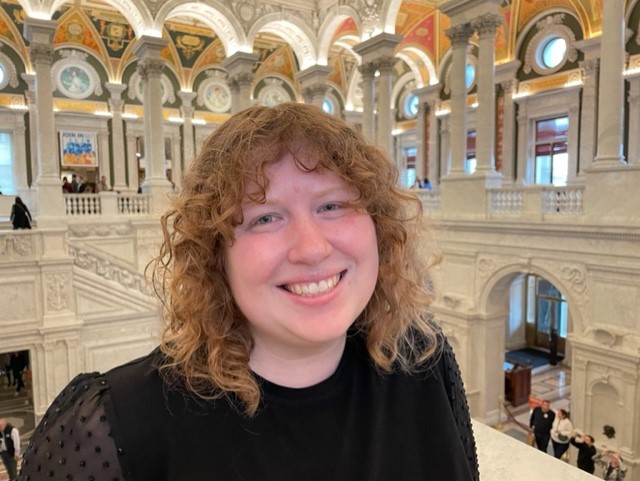Master’s Students and Alumni
Current Students
The below profiles reflect current students’ interests in and experiences of gender analysis at The Fletcher School. Students span degree programs, fields of study, and disciplines, and all have incorporated gender analysis into academic coursework, research, summer internships, and professional paths.
2025
Rebecca Kelly, MALD 2025
Rebecca is a MALD student studying gender and human security with interests in how gender intersects violence, migration, and peacebuilding. Originally from Chicago, she graduated from Tulane University in 2019 and worked for Congress in Constituent Services for four years, specifically on immigration issues. At Fletcher, she is a board member of the Conference on Gender and International Affairs (CGIA), the French table organizer, and member of the Fletcher Writing Club. Rebecca also is a Research Assistant for the Leir Insititute and a Graduate Assistant in the Office of Admissions.
Alumni
These alumni all pursued gender and intersectional analysis in their studies, research, or professional paths. Prior to 2015, when the initial Gender Analysis in International Studies field was officially created, students either self-designed a field of study with a focus on gender or incorporated gender perspectives into other fields of study.
2024
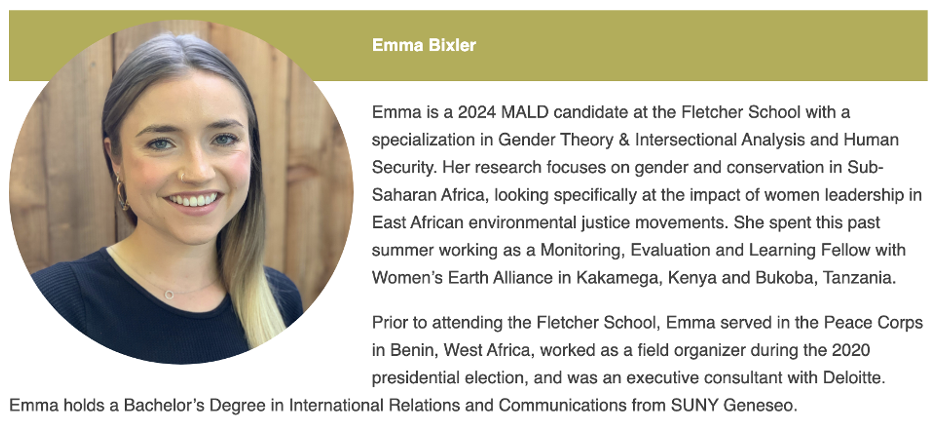
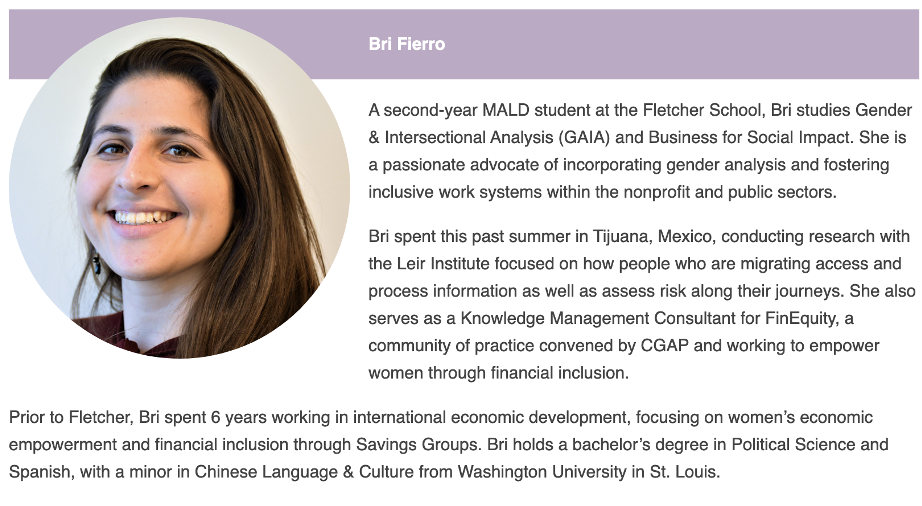
2022
Why is gender analysis important to you?
Gender analysis defines everything I do, both academically and professionally. I discovered feminist theory when I was starting my undergraduate degree, and since then it has been a fundamental part of who I am. Gender analysis is the lens through which I see the world; it has strengthened my understanding of power structures and empowers me to resist those structures every day.
Is there a book you’d recommend to someone who is interested in gender analysis, but has yet to dive into the field?
Two of my favorite books that provide a good entry into feminist theory and gender analysis are Living a Feminist Life by Sara Ahmed and The Seven Necessary Sins for Women and Girls by Mona Eltahawy. Both are easily accessible and not too dense, but touch on an array of issues and provide a grounding point for anyone looking to start reading feminist work and utilizing a gender analysis in their work.

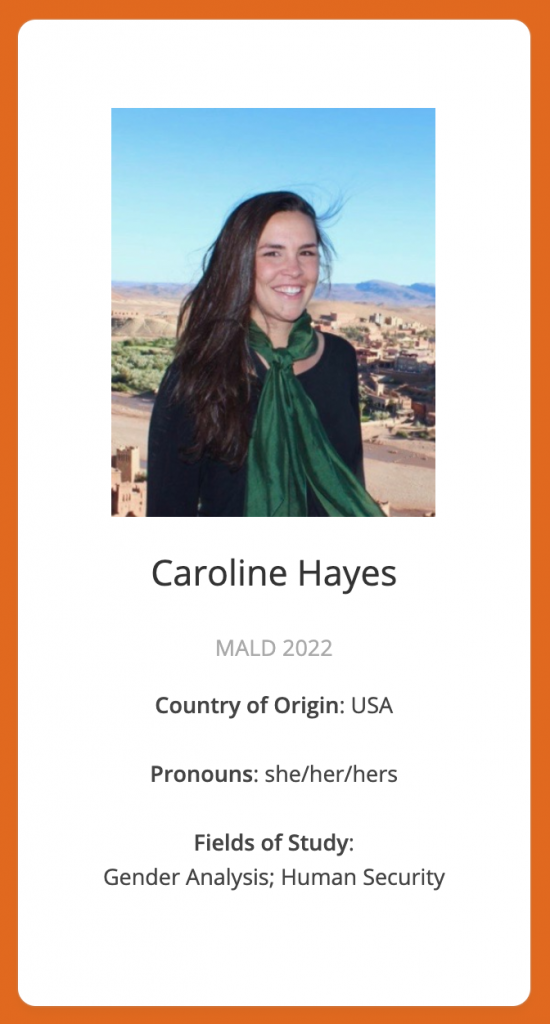
Why did you decide to come to Fletcher?
I’m a creative and collaborative person, which aligns well with the learning style at Fletcher. Fletcher is also a place where I have the freedom and flexibility to explore my diverse intellectual interests, from tracking how Twitter bots are influencing public opinion to assessing Saudi Arabia’s PR campaign promoting women in sports.
Why is gender analysis important to you?
Gender analysis has taught me to recognize the way intersections of gender, race, and class shape every institution in society. It has taught me to think critically about how behaviors and patterns that appear normal or natural on the surface are often underpinned by power dynamics.
Why is gender analysis important to you?
I started working on gender analysis in 2016 while working in the Colombian Congress under Former Senator Claudia López. I got the possibility of working closely together with grassroots organizations and women’s rights advocacy groups to bring back gender rights to the agenda. I learned that I wanted to dedicate my life and public service to achieving gender equality with this job. I started reading, going to lectures, having hard conversations with gender experts, but most importantly, noticing all the inequalities that, as a woman, I had to face in a patriarchal world. In 2017 with a group of friends, we founded SietePolas (sietepolas.com), a feminist organization and blog that would start a journey to activism for women’s rights online and infield. Gender analysis became something further than an activity. It became a way of living and questioning every decision I choose in life.
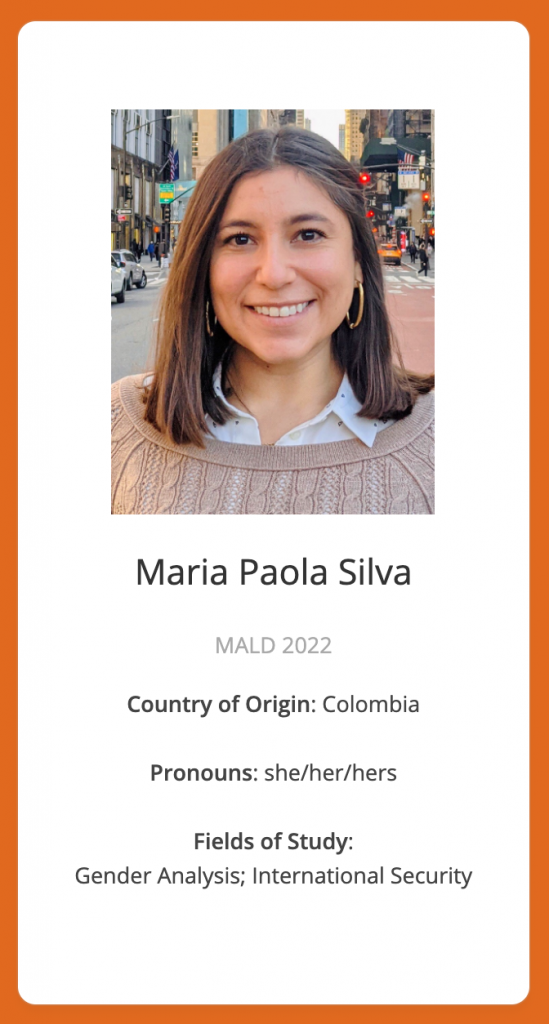
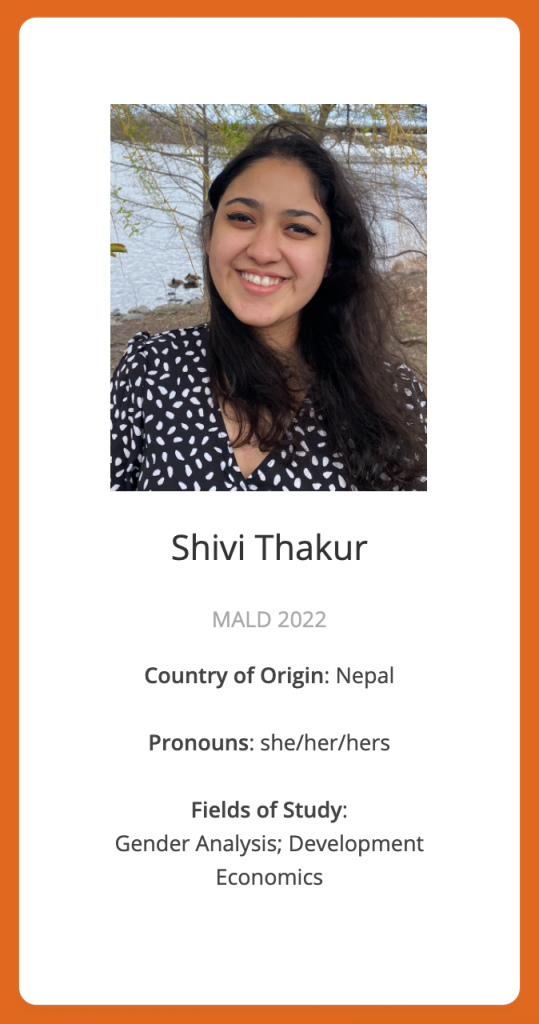
Why did you decide to come to Fletcher?
Fletcher’s flexibility to focus on various thematic issues within international development and I was particularly excited that gender analysis was a field of study I could take on at Fletcher.
Why is gender analysis important to you?
In my home country, gender inequality is very visible yet very invisible when it comes to challenging norms and practices that kept the patriarchy alive. Gender inequality is embedded in so many cultures and lifestyles that we fail to question why things are the way they are. I am grateful for my education and mentorship that has allowed me to incorporate gender as a way of analyzing what is and what is not happening in the world. As someone who wants to work in international development, I think gender analysis is crucial to create effective policies, programs, and projects that will genuinely challenge gender inequality and consider its role in development efforts.
2020
Tania Smith, F20
Country of origin: Haiti, United States
Interest in gender analysis: I truly enjoyed being in the Gender Analysis in International Studies field at Fletcher. The courses offered through the program has put gender at the forefront of thinking about effective decision making, program implementation, conflict resolution, and other disciplines where it is often an after-thought. Studying gender at Fletcher has forced me to think critically about what bodies, voices, and opinions are being left out of critical conversations about policy and how to better include them. As the fields of academia, international affairs, and others continue to grapple with questions on how to implement gender programming that ensures the impactful participation of men, women, sexual minorities, people of color, and other marginalized groups; I will be professionally equipped to help offer solutions to these issues upon my completion of the Gender program at Fletcher.
Emily Santos, F20
Country of origin: United States
Interest in gender analysis: I developed a particular interest in gender as a Peace Corps Volunteer (PCV) in Rwanda. Rwanda is a fascinating case study for gender analysis. It has the highest percentage of women in parliament in the world. They have made huge strides to implement policies that empower women, in property ownership, inheritance, health, and more. As a PCV, working on the ground, I heard people support the rhetoric and ideas of gender equality, but often, the concepts did not translate to action. I became passionate about working on these issues and, when coming to graduate school after Peace Corps, realized I wanted to continue learning about and expand my understanding of gender. The Fletcher School has not only taught me how to conduct a thorough gender analysis and the theory behind it, but it has given me opportunities to put this knowledge into practice. First, during a summer internship which I gained through a Fletcher connection, I helped create an organizational gender strategy for an NGO that focuses on countering violent extremism in Kenya. This internship gave me hands on experience thinking through and tackling some really challenging gender issues. Second, one of the highlights of my graduate school career has been working on the annual Conference on Gender and International Affairs. Through this conference, I have learned to mobilize support for gender issues, network with those who also care about this topic, and translate gender analyses to other fields of study. I will leave Fletcher with the tools to bring a gender lens into whatever comes next!
Kelsey Wise, F20
Country of origin: United States
Interest in gender analysis: My interest in gender analysis has been present for a very long time. I see the academic and professional use of a gender lens as a natural progression from growing up as an ardent feminist who believed dissent was the highest form of patriotism. I chose Fletcher because I think that it is a leader in the intersectional field of gender and international affairs–in the gender analysis concentration, extracurricular opportunities, and the community itself. Fletcher has truly enabled me to explore the field of gender analysis, pushed me to strengthen my critical thinking and analytical skills, and all in all has set me up to be a better feminist practitioner. For my capstone, I am conducting a gender analysis of the Saudi-led Coalition strategy in Yemen.
One of the best experiences I’ve had so far at Fletcher has been working on the annual Conference on Gender and International Affairs. It’s been incredibly gratifying to uphold Fletcher’s tradition of advocating for the integration of gender into the field of international relations. This summer, I interned at the United Nations Economic and Social Commission for Western Asia’s Centre for Women, in Beirut. A Fletcher gender analysis alumna helped connect me to the Centre. This internship gave me the opportunity to put my gender analysis skills to the test; I assisted with policy briefs and studies for member states on a wide variety of topics on gender in the Arab region. I look forward to continue learning and growing at Fletcher, and to what I hope will be a meaningful career in gender analysis.
2019
Komal Thakkar, F19
Country of origin: United States
Current role: Fellow, Charlie Goldsmith Associates
Interest in gender analysis: I’ve been interested in the barriers that women and girls’ face in accessing education for as long as I can remember. As I learned more about education issues from a gender lens, I began to develop an interest in the role of gender in a wide range of other issues.
Favorite academic moment of gender at Fletcher: Professor Theidon’s Gender Theory and Praxis course in the fall helped me develop the ability to analyze every issue from a gender lens. It genuinely changed the way I view the world, how I understand power, and the questions I ask in my daily life.
Favorite gender-related event at Fletcher: I was on the organizing team for Fletcher’s Conference on Gender in International Affairs in 2018. This was my favorite gender-related event and one of my proudest accomplishments at Fletcher. I learned about the role of gender in a variety of issues including environmental justice, international law, and the global economy.
Gender analysis in my current job: I work at a development consulting organization providing project support on education sector projects in Malawi. I am currently working on a girls’ education program which specifically supports girls who have dropped out of school or who have never attended. The program also supports marginalized boys in the community. Fletcher equipped me with the gender analysis skills to be able to assess and understand all of the different, layered gender issues that can prevent girls and boys from accessing education.
2016
David Cronin, F16
Fields of Study: Development Economics, Human Security
Interest in gender analysis: I became interested in gender analysis while working with former gang members at Homeboy Industries, a gang intervention and rehabilitation center in Los Angeles. I witnessed how much gender roles affected the people I worked with and wanted to learn more.
Gender analysis in the classroom: My favorite academic moment of gender at Fletcher was working on a group project in ‘Gender, Culture, and Conflict in Complex Humanitarian Emergencies’ with Catriona Jones, Gabriel Gonzalez-Kreisberg, and Laura Stankiewicz in Fall 2014. We researched and presented a gender analysis of Mara Salvatrucha (MS-13) in the Northern Triangle of Central America. Catriona and I then presented our research at the New England Council of Latin American Studies annual meeting in Fall 2015.
Favorite gender-related event at Fletcher: My favorite gender-related event at Fletcher was a film screening of “The Mask You Live In,” a documentary about the challenges boys and young men in the United States face with regards to society’s narrow definition of masculinity. This event prompted a few of us to form a dialogue group at Fletcher about manhood and masculinities.
Alisha Guffey, F16
Fields of Study: International Finance, Media and Entertainment for Social Change (self-designed field)
How I became interested in gender analysis: I previously worked with Female Engagement Teams in Afghanistan, but I wasn’t very focused on gender specific components of the military until I started to do some personal writing on my experiences. It really highlighted the unique experience of women in the military.
Gender in my studies at Fletcher: While at Fletcher, I became very interested in how media can influence and change society, so I decided to start a production company focused on personal narrative of post-conflict civilians and Veterans. My first project is related to LGBTQ Veterans, and it has really peaked my interest in gender analysis.
Gender analysis in my internship: I interned at Showtime Network this summer, where we did a marketing proposal on their new show for their CEO and executive team. Showtime was very interested in the gender dynamics of the show and how they play into the type of audience the show could attract.
Ameya Naik, F16
Country of origin: India
I became interested in gender analysis because… the political economy of conflict made very little sense without it.
A favorite moment of gender analysis at Fletcher: The guest lecture by Dr. Cynthia Enloe, titled “Patriarchy isn’t just a political side project: Why did it take me so long to figure this out?” The four feminist questions she outlined have been amazingly useful in all my analytic work ever since.
Gender analysis in my internship: While interning at the United Nations Department of Peacekeeping Operations (UNDPKO) on security sector reform, I prepared a briefing on integration of rebel forces into national armed forces. Prior to coming to Fletcher (especially prior to enrolling in Professor Mazurana and Stites’ course on gender, culture, and conflict), it wouldn’t have occurred to me to check on the gender composition of both rebels and national army. Having checked, I could include information on which countries would have to reform their laws or make alternative arrangements because they currently can only have all-male armies.
Héctor Antonio Portillo, F16
Country of Origin: Mexico/USA
Fields of Study: Monitoring and Evaluation (self-designed field), International Negotiation and Conflict Resolution
How I became interested in gender analysis: I found it to be a crucial tool to understand several issues that already interested me, but more importantly, I think a gendered analysis is fundamental to design and implement policies and programs that have a higher likelihood of creating positive change and avoiding negative unforeseen consequences.
A favorite experience of gender analysis at Fletcher: I’m currently part of an amazing group of students who, with the support of the World Peace Foundation, are organizing a seminar about Transforming Violent Masculinities. It was great to feel the support of faculty and fellow students as we continue to explore how a gender analysis can contribute to peacebuilding efforts throughout the world.
Favorite guest speaker on gender issues: In the spring of 2015, Gary Barker came to speak at Fletcher. Until then, it had not occurred to me that programs working on masculinities could have a strong effect on violence reduction and reintegration of gang members.
Jonathan Ramteke, F16
Fields of Study: Development Economics, International Trade
I am interested in gender analysis because… I am interested in making policy and research that is fair, inclusive, and accurate.
Favorite gender-related event at Fletcher: The Gender in International Affairs Conference, which I helped organize, was a lot of work, but one of the most rewarding experiences of my academic career!
Jessica Tsang, F16
Fields of Study: Gender Analysis in International Studies, Human Security
How I became interested in gender analysis: Growing up in DC, I have always been interested in international relations. As an undergraduate student, I became passionate about promoting human rights, especially women’s rights. In particular, I hope to work to combat human trafficking – a crime which very often contains a strong gender-dimension.
Gender analysis in my coursework: For my International Criminal Justice class, I wrote my final paper on Sexual and Gender-Based Crimes in the International Criminal Justice System. The research was quite exciting, as the Chief Prosecutor of the International Criminal Court is a woman, and under her tenure the Policy Paper on Sexual and Gender-Based Crimes was produced. There have been many crucial developments in this field, and it will be interesting to follow its progression.
Gender analysis in my summer internship: I was very fortunate to do my internship with Human Rights Watch. I worked in the Women’s Rights Division with the Senior Researcher who covers the Americas Region. My main project focused on femicide in Latin America and the Caribbean. It was a wonderful learning opportunity.
Kirsten Zeiter, F16
Fields of Study: Gender Analysis in International Studies, Monitoring and Evaluation (self-designed)
How I became interested in gender analysis: I have been interested in the role of gender in society for much of my life. I studied Women and Gender Studies during my undergraduate education, where I engaged in campus activism on gender justice and focused my studies on the intersection of gender and political theory. My interest in gender in the context of international affairs developed during my Peace Corps service in Morocco, where I worked on initiatives for girls’ access to sports and developed program design materials for volunteers interested in doing work on gender issues.
My experience with gender analysis at Fletcher: Gender analysis provides me with a unique lens that enriches my cross-disciplinary studies at Fletcher. For example, I was able to apply my understanding of gendered participation in civil society to my study of political participation in Human Rights Law. I’ve also enjoyed pursuing an independent study in feminist evaluation, which combines gender analysis, feminist inquiry, and participatory evaluation methodologies. This year, I had the opportunity to work on organizing the first-ever Conference on Gender and International Affairs at Fletcher, an extremely rewarding experience in which I was able to engage with my classmates in rich conversation on what it means to advocate for gender justice in a complex global environment.
Gender analysis in my summer internship: This summer, I had the opportunity to complete an internship with UN Women, where I gained professional experience with gender analysis and advocacy in the context of a multilateral organization. I was able to apply my interdisciplinary gender analysis skills to range of projects over the course of my internship, including developing gender-responsive procurement policies and promoting gender-responsive evaluation methodologies.
2015
Abby Fried, F15
Current Occupation: Program Assistant, Promundo
How I became interested in gender analysis: I didn’t plan on studying gender when I came to Fletcher; in fact, I had never studied it before and didn’t know much about it. But 15 minutes of Professor Mazurana on class ‘shopping day’ hooked me and forced me to completely alter my academic path to study gender and conflict.
Gender analysis in the classroom: I had a lot of great gender moments at Fletcher, but my favorite is probably the first day of Professor Mazurana and Professor Stites‘s class, Gender, Culture, and Conflict in Complex Humanitarian Emergencies. Having little gender study in my past, that first class was eye-opening. Once I saw things through a gender lens, I couldn’t stop seeing everything that way.
Favorite gender-related event at Fletcher: In the Spring of 2014, the inaugural Fletcher Women’s Leadership Award was given to Cornelia Schneider. This event was my favorite gender-related event at Fletcher for two reasons: first, it created an annual celebration of the achievements of Fletcher women; and second, because Connie Schneider gave a passionate and inspiring speech about her life’s work in peace building.
Rebekah Stewart, F15
Fields of Study: Latin America; International Negotiation and Conflict Resolution; Human Security
Current Occupation: Senior Associate, Growth Strategy and Development – Americas
How I became interested in gender analysis: When I was an undergraduate student at Occidental College, I was introduced to the fascinating work of a number of feminist scholars, and having that opportunity to engage deeply with feminist literature and the global women’s movement at Occidental really sparked my interest in gender analysis within the context of international affairs. I’ve always been very interested in how social identities are constructed, and I wrote my senior thesis on how race, class, and gender identity impact the experiences of indigenous women in Peru and Chile. I feel very lucky to have been able to continue studying gender at Fletcher!
A favorite gender-related event at Fletcher: During my final semester at Fletcher, the Gender Initiative and the Initiative on Mass Atrocities and Genocide sponsored a screening of the movie the The Mask You Live In, a documentary about masculinities in the United States. The screening took place during Fletcher’s Admitted Student Open House, and I was thrilled to see so many admitted students attend the film screening and stay afterwards to have rich discussions on gender identity. It was really inspiring to see so many prospective Fletcher students’ passion for gender analysis.
Gender analysis in my professional path: I currently work for an international education NGO, and in my role I help support social entrepreneurs throughout the Americas region who are seeking to launch education programs in their countries. Though my job is not specifically focused on gender analysis, helping entrepreneurs identify the root causes of inequity in their countries and how social identity (including gender) impacts the experiences of the children they seek to serve is central to Teach For All’s work with social entrepreneurs. I’m also planning to launch a gender studies working group for Teach For All staff members this year.
Dallin VanLeuven, F15
Current Occupation: Countering Violent Extremism Analyst at Search for Common Ground
My experience with gender at Fletcher: Gender issues are an intrinsic part of everything, from daily life to major international issues. Using gender analysis allows us to analyze problems from another perspective and gain new insights. Fletcher was a wonderful place to put this into practice, where every group project, paper, or even teaching opportunity became a chance to see how important issues affected men and women differently and how traditional responses often neglected to adequately take this into account, failing males and females alike.
Gender analysis in my summer internship: During my summer internship at the United Nations Office on Drugs and Crime in Senegal, I saw this in my work assessing the justice systems of Western Sahel nations and their citizens’ access to justice. Women face all the same barriers of access that men do—financial, geographic, linguistic, illiteracy, etc.—but women also faced special, gendered obstacles that quashed their cases or diverted them into informal, traditional justice mechanisms.
Gender analysis in my capstone project: My use of gender analysis culminated into my capstone project, which analyzed the Islamic State of Iraq and the Levant’s recruitment strategies through a gender lens. This project was only possible through the invitation, direction, and collaboration of Professor Dyan Mazurana and Rachel Gordon(F12), who co-authored this piece with me. It was later published as a chapter in the book, Foreign Fighters under International Law and Beyond (ASSER/Springer Verlag). Indeed, collaboration with Fletcher’s faculty and students is one of the highlights of my Fletcher experience. For example, this enabled me to work with Professor Mazurana on a variety of other issues, including the recruitment of child soldiers and conflict-related sexual and gender-based violence in Africa, both before and after graduation.
Gender and professional opportunities after graduation: In fact, I would directly credit the above work and my training on gender at Fletcher with helping me secure employment after graduation. With Search for Common Ground in the Middle East, I am able to continue my work on extremist recruitment, peacemaking, and capacity building in response to the Syrian conflict. In addition, I also recently began a Visiting Fellowship with the Feinstein Center. Of course, gender analysis will continue to remain an important tool for me in this work and all my future endeavors as well.
2014
Kenyon Laing, F14
Fields of Study: Gender and Migration Policy (self-designed); International Organizations
Current Occupation: Marketing and Communications Officer, Lawyers against Abuse (LvA)
I became interested in gender analysis because… As an undergrad in 2007, I interned full-time for six months with the National Organization for Women in NYC. During this time, we successfully lobbied for passage of the first anti-trafficking law in New York State. I then continued researching sex trafficking and prostitution policy after graduation as a Thomas J. Watson Fellow (2009-2010). From there, my interest in gender and gender analysis continued to widen. I began studying sexual violence in conflict, as well as sexual exploitation and abuse in UN peacekeeping, while at Fletcher. And I was fortunate to have the opportunity to work on conflict-related sexual violence as an intern with UN DPKO following graduation from Fletcher. I now work on broader sexual and gender-based violence issues, mainly domestic violence/intimate partner violence, rape, and sexual assault.
My capstone with a gender focus: My capstone/thesis was a statistical analysis of domestic prostitution policies’ impacts on trafficking in persons (TIP) rankings globally. I was happy to have an opportunity to consolidate my learning in these areas over the prior 7 years, and afterwards finally felt ready to move on to broader gender-based violence issues. Of course, I loved Professor Dyan Mazurana’s Gender, Culture & Conflict class, and being a part of the early stages of the Gender Initiative. I also LOVED a course I cross-registered for at Harvard Law School: “Gender Violence, Law & Social Justice,” by Professor Diane Rosenfeld. If you have the opportunity, take this course. It definitely had a big impact on me.
Gender analysis in my professional career: As I said before, I currently work on sexual and gender-based violence issues. Lawyers against Abuse (LvA) is a small non-profit organization that provides direct legal services and psycho-social support to victims of gender-based violence in Diepsloot, South Africa. Diepsloot is one of the poorest and most dangerous informal settlements in the country, and rates of gender-based violence (especially domestic violence/intimate partner violence, rape and sexual assault) are staggeringly high here. My work is mostly marketing and communications, with additional limited Monitoring & Evaluation work. A big part of my role is staying abreast of new relevant research, as well as disseminating our own gender-based violence research to raise public awareness of these issues. I also help design and facilitate LvA’s Sexual Violence Workshop Series, for which I often draw from my experiences and learning at Fletcher.
2013
Lisa de Bode, F13
Country of Origin: Belgium/The Netherlands
Current Occupation: Reporter, Al Jazeera America
How I became interested in gender analysis: Prior to coming to Fletcher I’d spent time reporting in Saudi Arabia, where I strived to tell stories upending some of the traditional narratives coming out of the Kingdom. Many news outlets portray Saudi women as inherently oppressed. Gender analysis became a way to dissect that trope and write more intelligently about a complex reality.
A favorite moment of academic learning about gender at Fletcher: The long hours I spent pouring over Professor Dyan Mazurana‘s course readings, scribbling notes, making sense of the world in a new way. I remember emerging from Harvard Square’s T-stop after one such afternoon, as people were moving up and down escalators, and looking at the world like a kind of matrix, where some people hold power and some do not, and it’s our job to expose those power imbalances.
Gender analysis in my professional path: As a journalist I strive to tell stories that speak truth to power. Gender analysis allows for honoring subjects’ lived experiences while finding those uncomfortable, hard-hitting questions that will expose truths.
Mollie Pepper, F13
Current Occupation: PhD student, Northeastern University
How I became interested in gender analysis: I have been fortunate throughout my life to have phenomenal, unapologetic female role models who demonstrated the power and possibility of challenging convention. My interest was formalized as an undergraduate at Sarah Lawrence College where I was introduced to feminist scholarship for the first time and realized that there was a whole field to engage with.
Gender-related capstone project: I wrote my capstone using a gender analysis to examine the connections between livelihoods and gender-based violence among Muslim refugees from Burma living in Thailand. I worked with Professor Karen Jacobsen and it was a fantastic learning experience.
Favorite gender-related event at Fletcher: Though I attended as an alumna, the recent conference on Gender in International Affairs at Fletcher was the best. To see such an incredible event take place at this institution where so many people had pushed for so long to make it possible…the feeling of seeing feminist activism come to some kind of fruition sent chills up my spine.
How I engage with gender in my current professional path: I am currently working towards a doctorate in Sociology at Northeastern University. My areas of specialization are in gender and violence, and my dissertation is about women’s participation in Burma’s ongoing civil conflict and political transition. I integrate gender into my teaching, professional life, and research. I am, fundamentally, a feminist scholar!
2012
Rachel Gordon, F12 and UEP12 (dual degree)
Fields of study: Human Security, Environment and Resource Management
Current Occupation: Researcher, Feinstein International Center
How I became interested in gender analysis: I’ve always been interested in gender analysis in that I’ve always been interested in power. During my first semester at Macalester College, I landed somewhat by accident in a course named “International Perspectives on Gender, Race, and Class,” which was a very powerful introduction to gender analysis as power analysis. I was hooked.
Gender in the academic offerings at Fletcher: A favorite moment was taking “Gender, Culture and Conflict in Complex Humanitarian Emergencies” (then the only gender-focused course offering) and finding that not only were there a fair number of men in the class but that many of them were as engaged and passionate as any of the women. It was refreshing to see men really engage in academic gender analysis; that wasn’t really something I’d seen a lot of previously.
Favorite gender-related event at Fletcher: I’m cheating a bit since I’ve stuck around to work at Tufts, but absolutely my favorite gender-related event was the gender conference in late 2015. It was a culmination of so much hard work by so many people, and it was absolutely incredible. In particular, having a Darfuri feminist slam poet open the event was the best thing I’ve ever seen in ASEAN auditorium, hands down.
Sebastián Molano, F12
Fields of Study: NGO Management, Human Security
Country of Origin: Colombia
Current Occupation: Gender and Program Management Consultant, Oxfam America
I became interested in gender analysis because… it brought a coherent narrative to different elements of my life. In understanding power dynamics from a gender perspective, I became fascinated by how I was able to make sense of the world, especially from a personal standpoint. It helped me to reflect on how my upbringing as a male in a conflict country has shaped my worldview, my attitudes and my approach to work. It allowed me to analyze first my own beliefs and behaviors before starting to do it in others.
Favorite gender-related event at Fletcher: Watching the documentary “Miss Representation” in the spring of 2012 in ASEAN auditorium. After the movie was over, a group of 15 students (2 men) stayed to chat about the film. Many of my female friends and colleagues shared their personal stories about how prevailing gender norms have affected their lives. It was a very powerful (and upsetting) experience.
Gender analysis in my professional path: After graduating from Fletcher, I have devoted my professional career to working on gender issues. First, I worked on promoting women’s political participation in Latin America and the Caribbean, and now, I am working on changing attitudes and behaviors about gender issues using e-learning tools. In my free time, I work on pushing a broader understanding of gender issues that include men and masculinity. I created and lead a group called Defying Gender Roles, to purposefully challenge harmful gender norms and roles in society. I could not have done any of this without my Fletcher education.
1991
Marcia Greenberg, F91
Current Occupation: Independent consultant on gender mainstreaming
I became interested in gender analysis because… I was always interested in women’s rights and inclusion. In 1997 I was offered a position as Gender and Democracy Specialist for the “WIDTECH project” – funded by USAID, based at the International Center for Research on Women, and managed by DAI. This was soon after the 4th World Conference on Women and the Beijing Platform for Action. Our role was to help USAID integrate attention to gender within various sectors: Democracy, Education, Health, Economic Growth and Natural Resource Management. There was a lot of on-the-job learning, but we were part of those first years of shifting from women-in-development to gender integration/mainstreaming.
Gender analysis in my professional career: Since 1997, my professional focus has been gender integration, gender analysis and gender mainstreaming. I have worked with USAID and its partners, for UNIFEM/UN Women and the IFC, and with the UNDP and the WFP to evaluate their gender policies. While I started with a focus on gender and democracy, I have also been a gender specialist for a youth development project, and for agriculture-focused projects. Over the years, it has become apparent that we have made a great deal of progress on advocating, making the argument that it is important to include women and to understand gender-based roles/responsibilities. We have moved from looking at women primarily as victims and marginalized, to also recognizing women as assets and contributors. Although it has been difficult, we have gradually moved from “gender” as a synonym for “women”, to “gender” meaning consideration of gaps of access and opportunity for men and women. There remain challenges: respect for women in many areas of the world, paying attention to masculinities and men along with women, and translating concepts to practice through institutional grounding of gender analysis and gender mainstreaming. From my perspective, I see change – and I am delighted by the dedication of recent Fletcher graduates and students to ensuring that gender analysis is an integral dimension of research and critical thinking; and that gender mainstreaming takes place within all organizations, businesses and governments.

